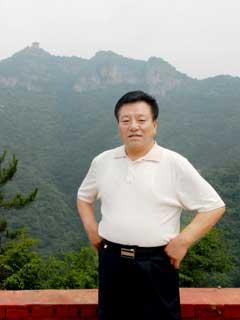Rags-to-riches coal mine owner sells off business to save dying tourist spot
YANGQUAN, Shanxi - Few people had a clue why Yang Lianfu was determined to sell his coal mine in 2000.
At that time, the price of raw coal began to exceed 100 yuan ($15) per ton with China's booming economy and soaring demand for the fossil fuel, while Yang's mine had an annual production capacity of 300,000 tons.
Even fewer people understood why Yang, a poor farmer's son who became a meilaoban (coal mine owner or boss), gave up the world he had built from scratch so resolutely.
Yang, 57, was born in a remote village of Yuxian county in Yangquan of North China's coal-rich Shanxi province.
"My mother passed away when I was very young and my father did everything he could to bring up my two brothers and me. I left school at 14 and did odd jobs to support the family," Yang said in a strong local accent.
"We were very poor at that time. The shoes on my feet were not the same pair. I wore a rubber sole green shoe on my left foot and a black cloth shoe on my right," he said.
As a teenager, Yang became a well-known carpenter in his village due to his diligence and superior woodworking skills.
He later worked at a local refractory plant and a foundry plant.
Yang's life changed at 19, when he started working as a miner in a small local coal mine, where he made 1.92 yuan each day for digging out 42 tons of coal and hauling it out a narrow tunnel in a handcart.
Back in the 1970s, that was a decent pay in China.
Just a year later, Yang built a house for his family with his savings.
In 1992, after he had toiled underground for nearly 20 years, Yang won a contract to operate a local town government-owned coal mine.
The annual production capacity of the mine gradually increased from the original 10,000 tons to 300,000 tons.

Yang Lianfu, a former coal mine owner in Yuxian county, Shanxi province, is now board chairman of the local Cangshan Mountain scenic area. Provided to China Daily
"A day will eventually come when there would be no coal left to dig," Yang said. "Coal resources are limited. The more we dig, the less we would be left with."
Believing that the days of the coal mining industry were limited, Yang started thinking about switching on to another business in 2000.
He first considered the real estate sector, but dropped the idea because "it is full of risks and uncertainty".
In 2003, the local government-run Cangshan mountain scenic area ran up a heavy debt. The government called upon local entrepreneurs to help save the area. No one, but Yang, responded to the cry for help.
Yang immediately signed an agreement with the county government to operate the area and took on the 10-million-yuan debt.
"But then I knew nothing about tourism," Yang said. "I just wanted to do something for my hometown, because the money I had earned came from the coal of my hometown."
Located in the wooded western range of Taihang Mountain, Cangshan Mountain has been known as a historic site of Kingdom Jin during the Spring and Autumn Period (770-476 BC).
According to the Shiji (The Historical Records) written by historian Sima Qian, Zhao Wu, the orphan of the Zhao family in the State of Jin, was hidden in Cangshan for 15 years and raised there by his diseased family's friends to avoid being killed by a treacherous official Tu'an Gu, who had killed all 300 Zhao family members. The orphan grew up to become the prime minister of the State of Jin and Tu'an was killed.
So far, Yang has invested 260 million yuan to expand the scenic area, inviting more than 80 history, cultural and ancient architecture experts to help him.
He has cooperated with Chinese director Chen Kaige to screen a film based on Zhao's story, as well as with the China Central Television (CCTV) to produce a TV drama.
Last year, 200,000 tourists visited Cangshan, with ticket sales topping 7 million yuan.
Although Yang's investment has not been recouped till now, he is optimistic about the future.
He recently inked contracts with more than 100 tourist agencies. Besides, three under-construction expressways passing the county will be completed within five years. Yang estimates the area's annual income will reach 100 to 200 million yuan in the future.
"To develop tourism needs a lot investment and patience. But as a sustainable industry, I think it will eventually pay off," Yang said.
Unlike Yang, who decided to quit the mining sector by choice, many meilaoban in Shanxi are now being forced out of the business, since the country's major coal-producing province started restructuring the industry last year.
The plan is to reduce the number of coal mines from 2,598 to 1,000 by the end of this year, shutting down all unsafe and small mines.
The number of coal mines in Yuxian county has been reduced from about 100 to 25.
"Many meilaoban in Yuxian are in the transition phase. I suggest they learn from Yang's experiences" said Lu Changzheng, the county's Party chief.
Speaking of Shanxi meilaoban, most Chinese will not hesitate to associate them with luxurious lifestyles, with frequent news reports about how this wealthy group squanders money on limousines and high-end villas.
"People hold a bias toward coal mine owners in Shanxi. Actually, a lot of them live a moderate lifestyle," said Yang, while admitting some do spend money like water.
"Both my kids found jobs by themselves after graduating and have purchased their own apartments on mortgage," he said. "To spend money properly is much harder than earning the money."
Xue Guangqin contributed to the story.





